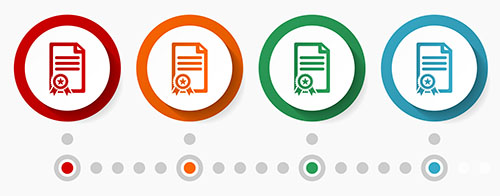 U.S. workers are turning to alternative credentials to enhance and demonstrate skills and work-readiness, according to new research from the Society for Human Resource Management (SHRM). The new report, The Rise of Alternative Credentials in Hiring, found that nearly half of U.S. workers (45%) say they have some form of an alternative credential. Among those who don't, about half (49%) have considered earning one. However, employers often lack the systems that can identify and validate alternative credentials.
U.S. workers are turning to alternative credentials to enhance and demonstrate skills and work-readiness, according to new research from the Society for Human Resource Management (SHRM). The new report, The Rise of Alternative Credentials in Hiring, found that nearly half of U.S. workers (45%) say they have some form of an alternative credential. Among those who don't, about half (49%) have considered earning one. However, employers often lack the systems that can identify and validate alternative credentials.
"Alternative credentials are key to uncovering untapped talent, especially when it comes to those job seekers who may not have the opportunity to build skills in a traditional way but have the competencies they need to succeed," said SHRM Foundation President Wendi Safstrom. "A majority of executives, supervisors, and HR professionals believe that including alternative credentials in hiring decisions can actually improve overall workplace diversity."
Key report findings include:
- Nearly three-quarters of U.S. workers (72%) agree they are an affordable way to gain the skills or experience necessary to enter a new job, and 77% agree that having a job-relevant alternative credential increases or would increase their chances of being hired for a job.
- People who hold alternative credentials bring value to the workplace, according to executives (87%), supervisors (81%) and especially HR professionals (90%).
- During a time of skills shortages, alternative credentials can uncover untapped talent. When employers recognize alternative credentials, it becomes easier for diverse candidates to obtain employment, according to 81% of executives, 71% of supervisors and 59% of HR professionals.
- Adjusting applicant tracking systems could help increase awareness of alternative credentials. Nearly half of HR professionals surveyed (45%) say their organization uses automated prescreening to review job applicant resumes, but only one-third of those (32%) say their automated system recognizes alternative credentials.
What are alternative credentials?
The most common types of alternative credentials are:
- Training certificates (52%)
- Course completion certificates (48%)
- Industry or professional certifications (38%)
Executives and supervisors ranked training certificates as well as course completion certificates among the most compelling alternative credentials. Work experience rates as the most important factor across supervisors, managers, and executives.
With today’s challenges in hiring, employers should consider the value of alternative credentials in combination with work experience. You just might find the needle in the haystack.
Source: CCH; SHRM